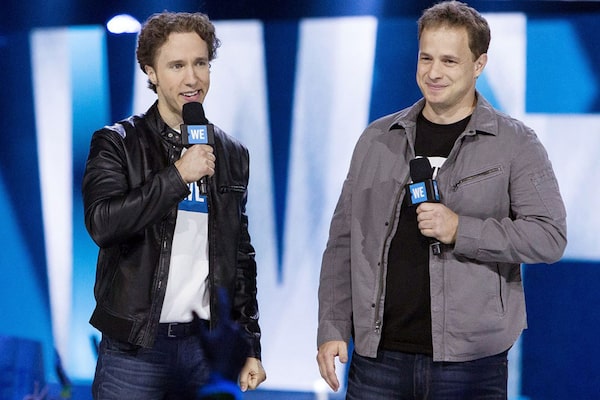
Craig Kielburger and Marc Kielburger, co-founders of the WE movement
In times of crisis, we rediscover what is truly important in our lives. As Canadians deal with the isolation of physical distancing, we have all gained greater appreciation for our connections with friends and loved ones, and with the wider world. We must revive and nurture the relationships that the COVID-19 pandemic has taken from us, for the sake of our well-being.
In this spirit, WE strives to provide support for youth, parents, educators and communities doing their best in these difficult times. Throughout this Globe and Mail special section, you will find information and resources to help you hold on to what is most important: children, family, health and connection. We would like to share a special thank-you to David Aisenstat for making this resource free for readers today.
It’s never been harder to be a parent. Many of us are trying to manage the new challenges of doing our jobs from home. Those who work in essential services are still out there, risking their own health to ensure that our society has what it needs to survive, from healthcare to groceries. As parents, we’re all trying to juggle work commitments with meeting the needs of our children, soothing their anxiety and holding them close, at the same time trying to keep their education on track while schools are closed.
To ease the burden, WE is leveraging our 25 years of experience working directly with young people and with more than 7,000 Canadian schools. The WE Schools @home initiative provides families and K–12 students with age-appropriate, cost-free, easy-to-use curricular resources delivered right to your inbox every week. These materials are supported by a daily one-hour live broadcast featuring dynamic educators and engaging celebrities (which gives parents at home a chance to catch a breather or add a productive hour to their day!). These offerings emphasize social-emotional learning for young people, including positive content to support their mental well-being.
Mental Health Week, May 4–10, has more significance this year than ever before. The tragic irony of COVID-19 prevention is that efforts to protect our physical health have put our mental health in jeopardy. WE is here to help you, your children and your family.
Sophie Grégoire Trudeau, an ambassador and ally of WE Well-being, has joined with WE to produce a series of podcasts promoting well-being. Each episode (downloadable for free) features practical self-care tips and enlightening conversations with prominent Canadians such as Tessa Virtue and Silken Laumann, as well as valuable information from mental health experts.
We have also released a helpful digital guidebook, The WE Well-being Playbook: Taking Care of You During COVID-19. This free downloadable e-book is designed especially for young people but is applicable to all ages, offering simple daily tips to cope with the disruption and anxiety brought on by the pandemic, through self-care and caring for others. And because teachers will be on the front lines helping their students cope and recover, we’re also supporting them, with professional development resources focused on trauma-informed education.
The pandemic has turned us largely inwards, focused on protecting our own families, communities and countries. But Canadians have always recognized the importance of not closing our hearts to the wider world. As bad as the crisis is at home, developing countries are far more vulnerable and will undoubtedly be hit much harder. Over the past 25 years, Canadians have funded WE’s global development work, including building hospitals, medical clinics and a medical college in Africa. WE is working with our partner communities around the world to help prepare and equip them for the pandemic, with public health education for prevention and medical supplies for treatment. In these pages we share stories of brave front-line health workers in places such as Narok County, Kenya, who are committed to protecting the most vulnerable.
This is the darkest time any generation has faced since the last world war. Then, at least, our grandparents could face the challenge standing shoulder to shoulder. Today we must face it in the isolation of our homes. But we must all remember that, while we are alone, we are alone together, and we will overcome this together.
Advertising feature produced by WE. The Globe’s editorial department was not involved.